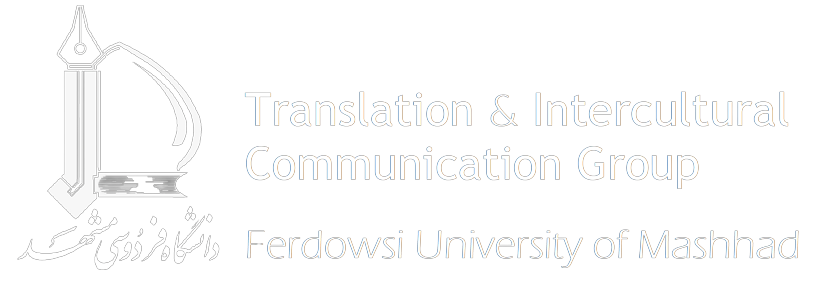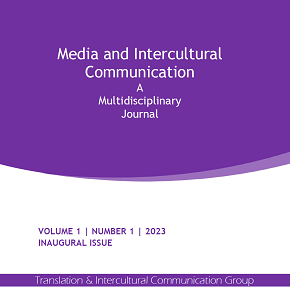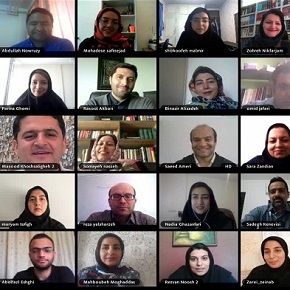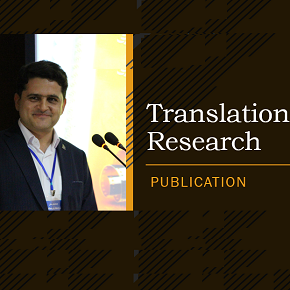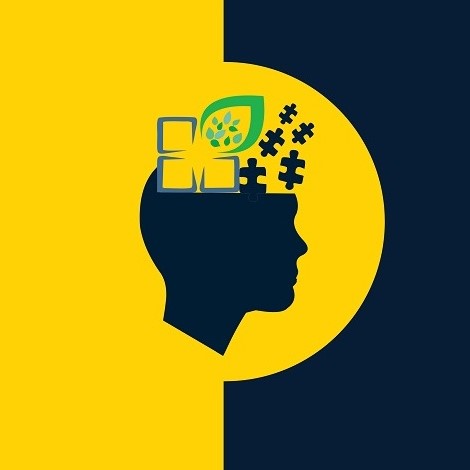Exploring Dubbing in Iran
Khoshsaligheh, M., Eriss, A., Mehdizadkhani, M. & Pakar, E. (2023). Translation of multilingual films in Iran in Persian dubbing. International Journal of Multilingualism, 1-21. https://doi.org/10.1080/14790718.2022.2155171
Eriss, A., & Khoshsaligheh, M. (2023). Stereotypes in a Multilingual Film: A Case Study on Issues of Social Injustice. Languages, 8(3), 1-13. https://doi.org/10.3390/languages8030174
Khoshsaligheh, M., Pakar, E., & Ghomi, P. (2023). Replotting and recharacterisation in dubbing: Renarration of audiovisual fiction. The Translator, 1-17. http://dx.doi.org/10.1080/13556509.2023.2203351
Ameri, S., & Khoshsaligheh, M. (2023). A survey on viewing preferences and habits of Iranian audience of audiovisual translation. Applied Linguistics Inquiry, 1(1). 50-66. https://doi.org/10.22077/ALI.2022.5258.1001
Khoshsaligheh, M., Sarvghadi, F., & Mohammad Alizadeh, B. (2022). Impact of song dubbing on singer’s characterization: Frozen in Persian. Journal of Audiovisual Translation, 5(1), 186–206. https://doi.org/10.47476/jat.v5i1.2022.189
Ameri, S., & Khoshsaligheh, M. (2021). Insights into Iranian younger audiences of Persian amateur subtitling. Onomázein, 56(2), 1-23. https://doi.org/10.7764/onomazein.56.08
Mehdizadkhani, M., & Khoshsaligheh, M. (2021). Insertion or voice-off in rendition of graphic codes: An experiment in Persian dubbing. Visual Communication, 20(1), 81-99. doi: https://doi.org/10.1177/1470357219838599
Pakar, E., & Khoshsaligheh, M. (2021). Cultural Mediation and gatekeeping in dubbing of American feature films on Iranian television. Journal of Intercultural Communication Research, 50(5), 459-480. https://doi.org/10.1080/17475759.2021.1954541
Alemzadeh, E., & Khoshsaligheh, M. (2020). The issues of culture and politics in redubbing Anglophone films in Iran. Journal of Intercultural Communication Research, 49(1), 1-21. https://doi.org/10.1080/17475759.2019.1703787
Pakar, E., Khoshsaligheh, M., & Khazaee Raveri, Z. (2020). Sīyāsat-e momayezī dar dūble-ye rasmī dar Īrān: Mored pazhūhī-ye se gāney-e pedar xānde dar zabān-e fārsi [Censorship in official dubbing in Iran: A case study of The Godfather triology]. Language and Translation Studies, 53(1), 129-165. https://doi.org/10.22067/lts.v53i1.82495
Ameri, S., & Khoshsaligheh, M. (2020). Dubbing viewers in cyberspaces: A Netnographic Investigation of the Attitudes of a Persian-language online community. Kome: An International Journal of Pure Communication Inquiry, 8(1), 23-43. https://doi.org/10.17646/KOME.75672.45
Pakar, E., & Khoshsaligheh, M. (2020). American House of Cards in Persian: culture and ideology in dubbing in Iran. Perspectives, 1-16. https://doi.org/10.1080/0907676X.2020.1819351
Danaiefar, M., Khoshsaligheh, M., & Pakar, E. (2020). Synchrony and translation quality in Persian unauthorized dubbing in Iran. SKASE Journal of Translation and Interpretation, 13(1), 2-20.
Khoshsaligheh, M., Eriss, A., & Ameri, S. (2019). The portrayal of women in English films localized into Persian. International Journal of Society, Culture & Language, 7(2), 40-51.
Khoshsaligheh, M., & Mohammad Alizadeh, B. (2019). Ravesh-hāye tarjome-ye āvākhtanī-ye āhang-hā dar dūble-ye Fārsī-e pūyānamā’ī-ye Lorax [Translation approaches of singable songs in the dubbing of Lorax]. Language and Translation Studies, 52(1), 27-51. https://doi.org/10.22067/lts.v52i1.80832
Delnavaz, F., & Khoshsaligheh, M. (2020). Anglophone allusions in Persian dubbing: The case study of Tarantino's films. Language and Intercultural Communication, 20(3), 255-269. https://doi.org/10.1080/14708477.2019.1687713
Mohammad Alizadeh, B., Hashemi, M., & Khoshsaligheh, M. (2019). Baresi-ye tarjomeh va avazesh ahang-hā dar pūyanamaiee-haye double shodeh be Farsi [Investigating the translation and singability of songs in Persian dubbed animated feature films]. Critical Language and Literary Studies, 16(22), 271-295.
Ameri, S., & Khoshsaligheh, M. (2018). Exploring the attitudes and expectations of Iranian audiences in terms of professional dubbing into Persian. HERMES-Journal of Language and Communication in Business (57), 175-193. https://doi.org/10.7146/hjlcb.v0i57.106206
Ameri, S., Khoshsaligheh, M., & Khazaee Farid, A. (2018). The reception of Persian dubbing: A survey on preferences and perception of quality standards in Iran. Perspectives, 26(3), 435-451. https://doi.org/10.1080/0907676X.2017.1359323
Khoshsaligheh, M., Ameri, S., & Mehdizadkhani, M. (2018). A socio-cultural study of taboo rendition in Persian fansubbing: An issue of resistance. Language and Intercultural Communication, 18(6), 663-680. https://doi.org/10.1080/14708477.2017.1377211
Mehdizadkhani, M., & Khoshsaligheh, M. (2017). Tarjome-ye neŝhāne nezām-e gerāfikī: Motāle'e-ye moredī-ye do nosxe-ye dūble-ye herfe-ī [Translation of graphic codes: the case study of two official Persian dubbed versions]. Language and Translation Studies, 50(3), 49-69.
Khoshsaligheh, M. (2016). Web-based unofficial dubbing into Persian: The status quo. AUSIT 2016 - Translation and Interpreting: Practice, Research and Publics. Melbourne. https://doi.org/10.22067/lts.v50i3.63480
Khoshsaligheh, M., & Ameri, S. (2016). Exploring the singability of songs in A Monster in Paris dubbed into Persian. Asia Pacific Translation Intercultural Studies, 3(1), 76-90. https://doi.org/10.1080/23306343.2015.1129781
Khoshsaligheh, M., & Ameri, S. (2016). Ideological considerations in official dubbing in Iran. Altre Modernità, 232-250. doi:https://doi.org/10.13130/2035-7680/6864
Ameri, S., Khoshsaligheh, M., & Khazaee Farid, A. (2015). Investigating expectancy norms in dubbing in Iran: An exploratory study. Translation Studies Quarterly, 13(51), 21-37. https://journal.translationstudies.ir/ts/article/view/336
Nord, C., Khoshsaligheh, M., & Ameri, S. (2015). Socio-cultural and technical issues in non-expert dubbing: A case study. International Journal of Society, Culture & Language, 3(2), 1-16.
Khoshsaligheh, M., & Ameri, S. (2014). Translation of taboos in dubbed American crime movies into Persian. T&I Review, 4(2), 25-50.
Exploring Audio Description in Iran
Khoshsaligheh, M., Shokoohmand, F., & Delnavaz, F. (2022). Persian audio description quality of feature films in Iran: The case of Sevina. International Journal of Society, Culture & Language, 10(3), 58-72. https://doi.org/10.22034/ijscl.2022.552176.2618
Khoshsaligheh, M., & Shafiei, S. (2021). Audio description in Iran: The status quo. Language and Translation Studies, 54(2), 1-30. https://doi.org/10.22067/lts.v54i2.2101-1006(R2)
Exploring Games Localization in Iran
Khoshsaligheh, M., Zoraqi, A. A., Lah, S. C., & Bernal-Merino, M. Á. (2023). Persian game localization scene in Iran: taking stock. Perspectives. https://doi.org/10.1080/0907676X.2023.2282700
Khoshsaligheh, M., Zoraqi, A. A., & Mehar Singh, M. K. (2024). Subtitling Practices in Semi-Professional Persian Game Localization. International Journal of Society, Culture & Language,12(1), 27-38. https://doi.org/10.22034/ijscl.2023.2005053.3068
Jooyaeian, E., & Khoshsaligheh, M. (2022). Translation solutions in professional video game localization in Iran. Games and Culture, 17(7-8), 1-21. https://doi.org/10.1177/155541202210777
Khoshsaligheh, M., & Ameri, S. (2020). Video game localisation in Iran: a survey of users’ profile, gaming habits and preferences. The Translator, 26(2), 190-208. https://doi.org/10.1080/13556509.2020.1724046
Khoshsaligheh, M., & Ameri, S. (2017). Āmeliyat-e Motarjem va Vizhegi-ha-ye Tarjome-ye Qeyr-e Herfe’ī Bāzihay-e Video’ī (Mored Pazhoohi Uncharted 4: Farjām-e Yed Dozd) [Translator’s agency and features of non-professional translation of video games (A case study of Uncharted 4: A thief's end)]. Language Related Research, 8(5), 181-204. http://lrr.modares.ac.ir/article-14-6499-en.html
Exploring Subtitling in Iran
Khoshsaligheh, M., Eriss, A., Mehdizadkhani, M., & Pakar, E. (2022). Translation of multilingual films in Iran in Persian dubbing. International Journal of Multilingualism, 1-21. https://doi.org/10.1080/14790718.2022.2155171
Mardani, V., & Khoshsaligheh, M. (2023). Attitudes of Non-professional Subtitlers towards Ethics in Subtitling English-Language Films into Persian. Language and Translation Studies, 56(2), 1-32. https://doi.org/10.22067/lts.2023.43313
Ameri, S., & Khoshsaligheh, M. (2022). Insights into Iranian younger audience of Persian amateur subtitling: a reception study. Onomázein, (56), 144-166. https://doi.org/10.7764/onomazein.56.08
Imani, S., & Khoshsaligheh, M. (2022). Keifiat seda va shakhsiat pardazi: mored pazhouheshi double-ye rasmi Farsi serial Sherlock [Voice Quality and Characterization in Dubbing: The Case of Sherlock in Persian Dubbing]. Language and Translation Studies, 55(2). https://doi.org/10.22067/jlts.2021.40472
Ameri, S., & Khoshsaligheh, M. (2021). An experiment on amateur and professional subtitling reception in Iran. SKASE Journal of Translation and Interpretation, 14(2), 2-21.
Imani, S., & Khoshsaligheh, M. (2021). Molāhezāt-e entekhāb-e sedā va sedā-pīsh-e dar dūbl-e Fārsī-e film va seryāl-e khārejī [Considerations in selecting the voice and voice actors in the Persian dubbing of foreign films and TV series]. Language Related Research, 12(4), 105-133. https://doi.org/10.29252/LRR.12.4.4
Zahedi, S., & Khoshsaligheh, M. (2021). Eyetracking the impact of subtitle length and line number on viewers’ allocation of visual attention. Translation, Cognition & Behavior, 4(2), 14-31. https://doi.org/10.1075/tcb.00058.zah
Khoshsaligheh, M., Ameri, S., Shokoohmand, F., & Mehdizadkhani, M. (2020). Subtitling in the Iranian mediascape: Towards a culture-specific typology. International Journal of Society, Culture & Language, 8(2), 55-74.
Zahedi, S., & Khoshsaligheh, M. (2020). xāneŝ-e vāzhehā-ye dārā-ye nīm fāsele dar zīrnevīs-e fīlm ba estefāde az radyāb-e ĉeŝmī: Mored pazhoohī-ye tarjome-ye fārsī-ye do fīlm-e farānsavī [Reading words containing half-space in film subtitles using eyetracking]. French Language and Translation Research, 3(1), 151-170. https://doi.org/10.22067/RLTF.2021.32533.0
Ameri, S., & Khoshsaligheh, M. (2019). Iranian amateur subtitling apparatus: A qualitative investigation. Mutatis Mutandis. Revista Latinoamericana de Traducción, 12(2), 433-453. https://doi.org/10.17533/udea.mut.v12n2a05
Zahedi, S., & Khoshsaligheh, M. (2019). Moqāyese-ye harekāt-e ĉeŝmī dar xāneŝ-e vazhegān-e qāmūsī va dastūrī-ye zīrvevīshā-ye fārsī bā estefād-e az fanāvarīy-e radyāb-e ĉeŝmī [A comparison of eye movements while reading lexical and functional words in Persian subtitles by using eye tracking technology]. Language Related Research, 10(4), 313-338.
Khoshsaligheh, M., Ameri, S., Khajepoor, B., & Shokoohmand, F. (2019). Amateur subtitling in a dubbing country: The reception of Iranian audience. Observatorio, 13(3), 71-94. https://doi.org/20.1001.1.23223081.1398.10.4.8.6
Fazeli Haghpanah, E., & Khoshsaligheh, M. (2018). Angīze-ha va dalāyele tarafdār-zīrnevīsī-ye fīlm-ha va seryāl-hāye kore'ī [Fansubbers’ Motivations and Reasons for Subtitling Korean Films and TV Series]. Language and Translation Studies, 51(3), 75-101. https://doi.org/10.22067/lts.v51i3.78719
Abdi, Z., & Khoshsaligheh, M. (2018). Applying multimodal transcription to Persian subtitling. Studies About Languages (32), 21-38. https://doi.org/10.5755/j01.sal.0.32.19212
Khoshsaligheh, M., & Fazeli Haghpanah, E. (2016). Farāyand va vizhegī-hay-e zīrnevīs-e qeyr-e herfe'ī dar Iran [The process and features of non-professional subtitling in Iran]. Language and Translation Studies, 49(2), 67-95. https://doi.org/10.22067/LTS.V49I2.59776
Exploring Voice-over in Iran
Ameri, S., & Khoshsaligheh, M. (2018). Voice-over translation of news programs on Television: Evidence from Iran. Hikma, 17, 9-32. https://doi.org/10.21071/hikma.v17i0.11029
Khoshsaligheh, M., & Ameri, S. (2016). Synchrony strategies in voiced-over English nature documentaries into Persian: implications for research and training. Journal of Media Practice, 17(1), 48-68. https://doi.org/10.1080/14682753.2016.1160562
Exploring Subtitling for the Deaf and Hard of Hearing in Iran
Shokoohmand, F., & Khoshsaligheh, M. (2019). Audiovisual accessibility for the deaf and hard of hearing in Iran. New Voices in Translation Studies, 21(1), 62-92.
Shokoohmand, F., & Khoshsaligheh, M. (2020). Zīrnevīs-e nāŝenāvāyān va kamŝenavāyān dar īrān: Rāhkārhāy-e matnīy-e zīrnevīs-e darūnzābānīy-e fārsī [Subtitling for the deaf and hard-of-hearing in Iran: Textual strategies for Persian intralingual subtitles]. Language Related Research, 11(1), 53-80. https://doi.org/20.1001.1.23223081.1399.11.1.7.6
Exploring Translator Education in Iran
Rastegarmoqadam, M., Khoshsaligheh, M., & Pishghadam, R. (2020). Dīdgāh-e dāneŝjūyān-e motarjemī-ye zabān-e engelīsī be mahārat-e kār-e tīmī dar kelās-e āmūzeŝ-e zīrnevīs [The view of English translation students about teamwork in subtitling classes]. Language Related Research, 11(3), 95-119. https://doi.org/20.1001.1.23223081.1399.11.3.7.0
Baghi, H., & Khoshsaligheh, M. (2019). Stress in written and sight translation in training setting. Hikma, 18(2), 237-255.
Khoshsaligheh, M., & Moghaddas, M. (2019). English translator training curriculum revisited: Iranian trainees’ perspectives. Teaching English Language, 13(2), 181-212. https://doi.org/10.22132/TEL.2019.96238
Moghaddas, M., & Khoshsaligheh, M. (2019). Implementing project-based learning in a Persian translation class: A Mixed-methods study. Interpreter and Translator Trainer, 13(2), 190-209. https://doi.org/10.1080/1750399X.2018.1564542
Khoshsaligheh, M., Mehdizadkhani, M., & Kayvan, S. (2017). Severity of types of violations of research ethics: Perception of Iranian master’s students of translation. Journal of Academic Ethics, 15(2), 125-140. https://doi.org/10.1007/s10805-017-9277-y
Heydari, F., Khoshsaligheh, M., & Hashemi, M. (2016). Narrative intelligence represented in translational success: Issues of coherence, gaps, complexity and aesthetics. Sri Lanka Journal of Social Sciences, 39(2), 75-87. http://dx.doi.org/10.4038/sljss.v39i2.7442
Salemi, F., Khoshsaligheh, M., & Hashemi, M. (2015). Cultural orientations of Iranian English translation students: Do gender and translation quality matter. Journal of Research in Applied Linguistic, 6(2), 21-35. https://doi.org/10.22055/RALS.2015.11335
Khoshsaligheh, M. (2014). Tavāneŝhā-ye hadaf dar āmūzeŝe motarjeme fārsī va engelīsī [Target competences in training Persian-English translators]. Language and Translation Studies, 47(3), 113-143. https://doi.org/10.22067/lts.v47i3.41362
Khoshsaligheh, M., & Salari, Z. (2014). The translation construed by students in translator training programs in Iran. Iranian EFL Journal, 10(5), 60-75.
Samir, A., & Khoshsaligheh, M. (2014). Emtīyāzdehī-ye tarjome dar āmūzeŝe motarjeme englīsī [Rating translations while training English translators]. Translation Studies Quarterly, 10(44), 7-22.
Samir, A., Khoshsaligheh, M., & Ghazizadeh, K. (2014). Moqāyese-ye rūykarde arzyābīy-e modaresān-e tarjome-ye fārsī bā nazarīye hāy-e ŝaxese arzyabī-ye tarjome [A comparison of the assessment approach of Iranian translation teachers with the prominent theories of translation assessment]. Language and Translation Studies, 47(1), 59-84. https://doi.org/20.1001.1.22285202.1393.47.1.4.2
Khoshsaligheh, M., Jamali, F., & Saeedian, A. (2014). Attitude of Iranian graduate students toward English: A case study. English Language Teaching, 1(2), 108-130.
Sari, S., Khoshsaligheh, M., & Hashemi, M. (2013). Motāle'e-ye towsīfī-ye farāyand-e tarjome-ye motarjemān-e tāze kār-e engelīsī [A descriptive study on the translation process of novice English translators]. Journal of Foreign Language Research, 2(2), 43-64. https://doi.org/10.22059/JFLR.2012.50917
Khoshsaligheh, M. (2013). Attention to indications to embedded ideologies in discourse across translation educational levels and gender. Studies in Applied Linguistics, 3(2), 141-173.
Samir, A., & Khoshsaligheh, M. (2012). Bāzxord-e dāneŝjūyān-e tarjome-ye engelīsī darbāre-ye rūykard-hā-ye modaresān-e tarjome dar arzyābīy-e keyfīyat-e tarjome [The feedback of English translation students about the approach of translator trainers in evaluating translation quality]. Language and Translation Studies, 45(3), 1-21.
Khazaee Farid, A., & Khoshsaligheh, M. (2010). Insight from EMT for translator training in Iran. Studies in Applied Linguistics, 1(1), 135-152.
Exploring Translation Psychology in Iran
Khoshsaligheh, M., Pishghadam, R., Rahmani, S., & Ameri, S. (2018). Relevance of emotioncy in dubbing preference: A quantitative inquiry. Translation & Interpreting, 10(1), 75-91. https://doi.org/10.12807/ti.110201.2018.a05
Shadman, N., Khoshsaligheh, M., & Pishghadam, R. (2019). Iranian literary translators’ emotional intelligence: Description of facets. SKASE Journal of Translation and Interpretation, 12(1), 29-47.
Shaki, R., & Khoshsaligheh, M. (2017). Personality type and translation performance of Persian translator trainees. Indonesian Journal of Applied Linguistics, 7(2), 122-132. https://doi.org/10.17509/ijal.v7i2.8348
Exploring Translation Sociology in Iran
Kafi, M., Khoshsaligheh, M., & Hashemi, M. (2018). Translation profession in Iran: Current challenges and future prospects. The Translator, 24(1), 89-103. https://doi.org/10.1080/13556509.2017.1297693
Khajepoor, B., Khazaee Farid, A., & Khoshsaligheh, M. (2017). Nazarīye-ye zaxāye-re farhangīy-e Zohar va barrasī-ye rāhbordhāy-e tarjome-ye rīzfarhanghā: Mored pazhūhī-ye romān-e dā'ī jān nāpelōn dar barābar-e tarjome-ye Engelīsī [Zohar's theory of cultural repertoire and a study on the translation of microcultures: A case study of the novel ‘My Uncle Napolean’ against its English translation]. Language and Translation Studies, 50(1), 2-23. https://doi.org/10.22067/lts.v50i1.58658
Khoshsaligheh, M. (2018). Seeking source discourse ideology by English and Persian translators: A comparative think aloud protocol study. International Journal of Society, Culture & Language, 6(1), 31-46.
Khoshsaligheh, M., Kafi, M., & Noorani, S. N. (2018). Translators’ image in Iranian feature films: A sociological perspective. FORUM. Revue internationale d’interprétation et de traduction/International Journal of Interpretation and Translation, 16(2), 324-340. https://doi.org/10.1075/forum.16031.kho
Kafi, M., Khoshsaligheh, M., & Hashemi, M. (2016). Typology of capitals expected and received by Iranian translators. SKASE Journal of Translation and Interpretation, 9(1), 26-43.
Khoshsaligheh, M., & Mazinani, H. (2012). Eqtebās: Rūykardī ejtemā'ī-farhangī dar tarjome (Motale'e-ye moredī-ye eqtebās-e Ārnold az dāstān-e rostam va sohrāb) [Adaptation: A socio-cultural approach in translation (A Case study of the adaptation of Arnold in Rostam and Sohrab)]. Language and Translation Studies, 45(1), 43-59.
Exploring Literary Translation in Iran
Khoshsaligheh, M., Kafi, M., & Ameri, S. (2020). Fiction translation expectancy norms in Iran: A quantitative study of reception. Translation and Interpreting, 12(1), 74-89. https://doi.org/10.12807/ti.112201.2020.a05
Arab Torbarti, N., Khoshsaligheh, M., & Poorkhaleghi Chatroodi, M. (2018). Naŝr-e tarjome-ye adabīyāt-e kūdak va nowjavān: Vaz'īyat-e konūnī [The publication of children's literature: The status quo]. Journal of Children's Literature Studies, 9(1), 91-112.
Khoshsaligheh, M., & Soleimanirad, E. (2018). Barrasī-ye hamāyandhā dar ŝafāfīyat va ravānī-ye matne tarjome ŝode: Mored pazhūhī-ye ketāb-e bīst dāstān az bīst nevīsande-ye barande-ye jāyeze-ye nobele adabīyat [A study on collocations in the clarity and fluency of the translated texts: A case study of Bist Dastan by twenty Nobel prize winning authors]. Language and Translation Studies, 51(1), 65-92. https://doi.org/10.22067/lts.v51i1.73676
Behzadi, M., Khazaee Farid, A., & Khoshsaligheh, M. (2017). Tahlīl-e ŝīveha-ye gūnāgūn-e bāznamā'ī-ye dastānha-ye fārsī qabl va ba'd az nehzat-e tarjome dar asr-e qājār [An analysis of the different ways of speech representation in Persian novels before and after the translation movement during the Naseri era]. Persian Language and Literature, 23(79), 7-32.
Bijani, S., Khoshsaligheh, M., & Hashemi, M. (2014). Categorization of the fiction translation expectancy norms to Iranian undergraduate readership. Asia Pacific Translation and Intercultural Studies, 1(3), 1-12. doi:http://dx.doi.org/10.1080/23307706.2014.956982
Soleimanirad, E., Khazaee Farid, A., & Khoshsaligheh, M. (2014). Barrasī-ye tafāvote zabāne noxostīne namāyeŝnāmehāy-e tarjome ŝode bā namāyeŝnāmehāy-e tarjome ŝode-ye mo'āser dar Īrān [The difference between the first language of the translated plays with the translated plays of the contemporary age in Iran]. Journal of Persian Language and Literature, 6(20), 47-68.
Miscellaneous Topics
Delzendehrooy, S., Khazaee Farid, A., & Khoshsaligheh, M. (2019). Despotism and translation in Iran: The case of Naseri House of Translation as the first state translation institution. inTRAlinea, 21(1), 1-11.
Nowruzy, A., & Khoshsaligheh, M. (2018). Naqŝe-ye towsīfī-ye motāleāt-e tarjome dar Īrān bar asāse pāyān nāmehāy-e kārŝenâsī-ye arŝad [A descriptive map of Translation Studies in Iran based on M.A. theses]. Critical Language and Literary Studies, 15(20), 275-293.
Sahaf, A., & Khoshsaligheh, M. (2017). Ĉāleŝhā-ye zabānī va farāzabānī dar tarjome-ye ŝafāhīy-e motavālī: Mored pazhūhīy-e tarjome-ye soxanrānī-ye Barāk Obāmā [Linguistic and extralinguistic challenges in consecutive interpreting: A case study of Barack Obama's speech]. Journal of Foreign Language Research, 5(1), 19-39. https://dx.doi.org/10.22059/JFLR.2015.62509
Sahaf, A., Khoshsaligheh, M., & Ghazizadeh, K. (2015). Rāhkārha-ye motarjemāne ŝafāhī-ye tāzekār-e Īrānī dar tarjome-ye soxanrānī-ye sīasī [The strategies of novice Iranian interpreters while interpreting political speeches]. Translation Studies, 13(50), 19-32.
Khoshsaligheh, M. (2013). A translation criticism: A critical study of discourse in translation. International Journal of Interpretation and Translation, 11(2), 75-93.
Farnia, M., & Khoshsaligheh, M. (2012). Responses to unfounded accusation across cultures. Language, Society and Culture, 34(34), 43-50.
Book Reviews
Khoshsaligheh, M., & Zoraqi, A. (2022). Review of enhancing video games localization through dubbing. Translation and Translanguaging in Multilingual Contexts, 8(3), 344-349.
Vasheghani Farahani, M., & Khoshsaligheh, M. (2021). Review of Liu (2020): Corpus-assisted translation teaching: Issues and challenges. Babel - International Journal of Translation, 67(6), 9-14. https://doi.org/10.1075/babel.00242.far
Shadman, N., & Khoshsaligheh, M. (2021). Review of innovation and expansion in translation process research. Forum: International Journal of Interpretation and Translation, 19(2), 211-216. https://doi.org/10.1075/forum.21018.sha
Shadman, N., & Khoshsaligheh, M. (2020). Review of translation and emotion. The Journal of Specialised Translation, 16(34), 221-223.
Ameri, S., & Khoshsaligheh, M. (2019). Review of Diaz-Cintas, Jorge Díaz & Kristijan Nikolić, eds. (2018) Fast-forwarding with Audiovisual Translation. Translation and Translanguaging in Multilingual Contexts, 5(3), 319-323. https://doi.org/10.1075/ttmc.00039.ame
Khoshsaligheh, M., & Nowruzy, A. (2016). Naqd-e ketāb-e raveŝ ŝenāsīy-e pazhūheŝ dar motāle'at-e tarjome [Review of research methodologies in Translation Studies]. Critical Studies in Texts and Programs of Human Sciences, 16(4), 121-136.
Khoshsaligheh, M. (2014). Book review of critical readings in Translation Studies, 2010, edited by Mona Baker, Routledge. International Journal of Society, Culture & Language, 2(2), 112-119.
Conference Presentations
Khoshsaligheh, M. (2022). Dubbing varieties in the Iranian mediascape: typology revisited [Paper presentation]. The 4th Conference on Interdisciplinary Approaches to Language Teaching, Literature and Translation Studies, Ferdowsi University of Mashhad, Iran.
Khoshsaligheh, M. (2019). Translation and the media in Iran: Issues in research and didactics. Conference on Translation and the Media. Mashhad: Ferdowsi University of Mashhad.
Khoshsaligheh, M. (2019). Media localization in Iran: Pitfalls in research and practice. International Conference on English Language Studies. Isfahan: University of Isfahan.
Khoshsaligheh, M. (2019). Audiovisual retranslation in Iran and the socio-cultural premises of the time. National Conference on New Trends in Applied Linguistics and Translation Studies. Isfahan: Sheikhbahaee University.
Noora, M., Khazaee Farid, A., & Khoshsaligheh, M. (2019). Ta'sīr-e garte bardārī bar adabīyāt-e dāstānī dar do dahe-ye axīr [The effect of calquing on fiction in the two recent decades]. The Fifth National Conference on Language and Literature, (pp. 1-7). Tehran.
Khoshsaligheh, M., & Shadman, N. (2018). The emotional intelligence of Iranian prominent literary translators across genders. 2nd Valencia/Napoli Colloquium on Gender and Translation: Translating/Interpreting LSP through a Gender Perspective. Naples.
Khoshsaligheh, M. (2017). A sketch of Audiovisual Translation Studies in Iran. 3rd Conference on Interdisciplinary Approaches to Language Teaching, Literature and Translation Studies. Mashhad: Ferdowsi University of Mashhad.
Khoshsaligheh, M. (2017). Learners’ input on teaching Persian translation: Empirical findings on ideals, flaws and expectations. National Conference on Interdisciplinary Approaches to Translation Education. Tehran: Khatam University.
Khoshsaligheh, M. & Ameri, S. (2017). Didactics of Audiovisual Translation in Iran so far: Prospects and solutions. National Conference on Interdisciplinary Approaches to Translation Education. Tehran: Khatam University.
Khoshsaligheh, M., Mehdizadkhani, M., & Ameri, S. (2016). Through the Iranian fansubbing glass: Insights into taboo language rendition into Persian. Audiovisual Translation: Dubbing and Subtitling in the Central European Context. Nitra. Slovakia.
Khoshsaligheh, M., & Aqamolaei Javaran, E. (2016). Barrasīy-e moādel-hā-ye vāzhey-e taqvā dar bīst tarjome-ye fārsī va engelīsī-ye qorān-e majīd [A study on the equivalents of the word "taqva" in twenty Persian and English translations of the Holy Quran]. The National Conference of Translation and Interdisciplinary Studies. Birjand.
Khoshsaligheh, M., Mehdizadkhani, M., & Kayvan, S. (2016). Exploring Polish students’ perception of plagiarism: Instances and types. 8th World Conference on Educational Sciences. Alcala: University of Alcala.
Mehdizadkhani, M., Khoshsaligheh, M., Khazaee Farid, A., & Szarkowska, A. (2016). Dubbing v. subtitling in rendition of visual verbal in English to Persian audiovisual translation. 3rd Intermedia Conference on Audiovisual Translation. Łódź.
Mehdizadkhani, M., Khoshsaligheh, M., & Saeedian, A. (2016). Technology in translation in English translation master’s program: Students’ perspectives. 1st CTER Congress (CTER 2016). Krakow.
Khoshsaligheh, M. (2015). Translation as a profession in Iran from a sociological perspective. TII Sixth Annual International Translation Conference. Doha: Hamad Ibn Khalifa.
Pourali, M., Khoshsaligheh, M., & Ghonsooly, B. (2015). Product norms of website localization into Persian. 2nd Conference on Interdisciplinary Approaches to Language Teaching, Literature and Translation Studies. Mashhad: Ferdowsi University of Mashhad.
Behzadi, M., Khazaee Farid, A., & Khoshsaligheh, M. (2015). Moqāyese-ye mīzān-e kārbord-e goftār-e mostaqīm (azād) va goftār-e qeyr-e mostaqīm dar romāns va romān-hā-ye fārsī [A comparison of the usage of direct speech (free) and indirect speech in Persian novels]. 2nd Conference on Interdisciplinary Approaches to Language Teaching, Literature, and Translation Studies. Mashhad: Ferdowsi University of Mashhad.
Khoshsaligheh, M., Keyvan, S., & Mehdizadkhani, M. (2015). Dalāyele serqat-e elmī tavasot-e dāneŝjūyān-e tahsīlāt-e takmīlī-ye reŝte-hā-ye zabān-hā-ye xārejī [The reasons of plagiarism by graduate students in foreign languages]. The Second Conference on Interdisciplinary Approaches to Language Teaching, Literature, and Translation Studies. Mashhd: Ferdowsi University of Mashhad.
Khoshsaligheh, M., Mehdizadkhani, M., & Saeedian, A. (2014). Barasī-ye towsīfī-ye piŝgoftār-hā-ye motarjem dar āsār-e muhamad qāzī [A descriptive study on the translators' prefaces in the works of Muhammad Ghazi]. The Conference on Iranian Kurdish Translators. Sanandaj.
Khoshsaligheh, M. (2013). Soft spots of English language teachers in private language schools in Mashhad. The 11th TELLSI International Conference. Mashhad: Tabaran Institute of Higher Education.
Hashemi, M., Khoshsaligheh, M., & Erfani Hamidi, A. (2013). The place of translation technologies in Iranian translator training programs. The First International Conference on Interdisciplinary Translation Studies. Mashhad: Imam Reza University.
Khoshsaligheh, M. (2013). Exploring ideological discourse structures in English and Persian translator education. The First International Conference on Interdisciplinary Translation Studies. Mashhad: Imam Reza University.
Khoshsaligheh, M., & Salari, Z. (2013). Barrasīy-e dīdgāh-e motarjemān-e javān be axlāq-e tarjome dar tajome adabī: Pazhoheŝī keifī [A study on the views of young ethical translators in literary translators: A qualitative study]. The Conference on Contemporary Persian. Tehran: Allameh Tabataba'i University.
Khoshsaligheh, M. (2012). EFL competence, translation competence, or translator competence: An unfortunate compromise. The First Conference on Language Learning & Teaching: An Interdisciplinary Approach. Mashhad: Ferdowsi University of Mashhad.
Khoshsaligheh, M., Haroon, H., & Karimdadian, S. (2011). Social constructivism in English and Persian translation class. Seminar on Translation of South East Asian Languages. Universiti Sains Malaysia.
Hashemi, M., Khoshsaligheh, M., & Karimdadian, S. (2010). Demographics of English translation program: A case study of Iranian undergraduates. National Conference on Translation Studies. Birjand: University of Birjand.
Khoshsaligheh, M. (2009). Vocabulary learning strategies employed by Iranian EFL learners and their relations to listening performance. UPALS ICL: International Conference on Languages. Universiti Teknologi MARA.
